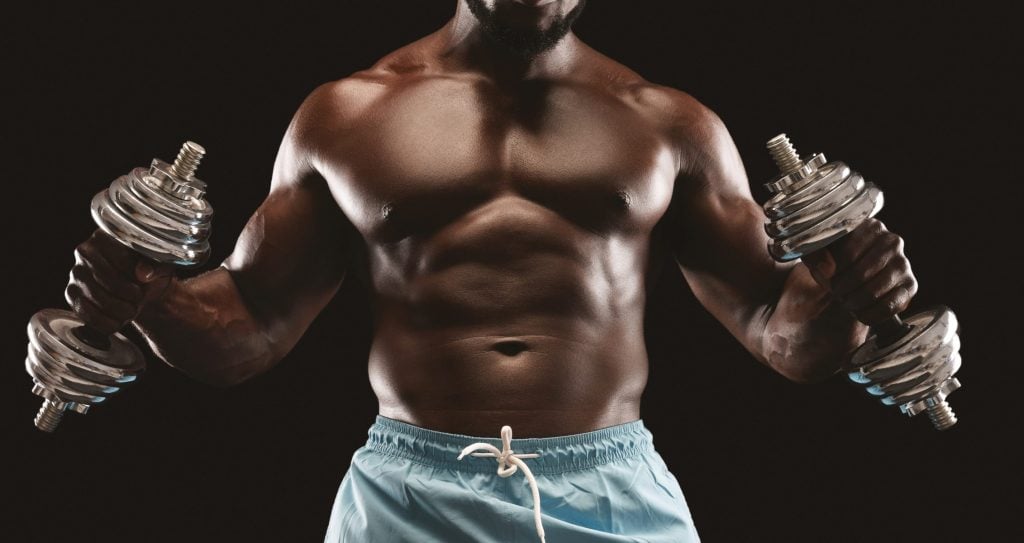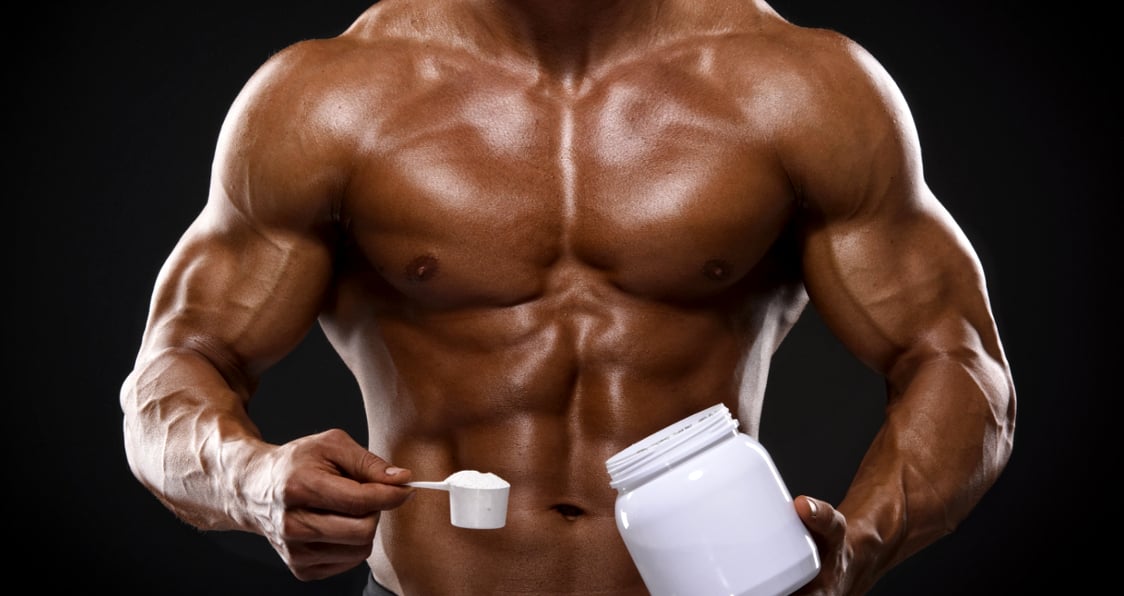Creatine is a great supplement to help with that desired bodybuilding growth, but which form is better for your gains? Monohydrate vs HCL.
Creatine is a very popular and widely used bodybuilding supplement by athletes and gym goers alike, for it has great abilities for muscle growth in a safe and effective way. Creatine is a staple supplement for many as it is also highly reliable, being a well-research product that recreational and professional athletes can trust. Depending on the other supplements in your stack, such as protein powder and pre-workout, creatine should be one and the benefits will make you want to add it. As a trusted and highly researched supplement, it is important to use this as an example of a safe and effective product when looking to add some muscle mass and strength gains. When it comes down to choosing creatine, looking at either creatine monohydrate vs. HCL are your best bets, and choosing between these two can be difficult. Below we help you answer the key factors to the two popular types of creatine, creatine monohydrate vs. HCL, and which form is best for your muscle gains.
(If you want the best rated creatine supplement, here is a quick answer!)
When it comes to supplements and the efficacy of them, it really can be challenging to understand just what each supplement does and how it can affect our bodies, both positively and negatively. Many supplements are created to be highly safe and effective, but knowing what to look for is beyond important for many companies may put ingredients in their formulas that just don’t need to be there. When it comes to creatine, the formula is fairly simple and couple that with an effective muscle-building supplement and it’s no wonder why this has grown with such popularity for performance goals.
There are a few different types of creatine, each structured differently and focusing on certain areas of your health and fitness in order to promote growth and a healthier lifestyle. Let’s take a look at creatine and dive into each of these forms. What you’ll find is while they both have benefits for your bodybuilding goals, you may have better results with one over the other. Doing additional research will prove to be key for everyone is different, but what you will find with whatever form of creatine you choose is a great addition to your supplement routine and the benefits of a strong, shredded physique and performance.
What Is Creatine & How It Works?
Creatine is naturally occurring in our bodies and is found in the muscle cells as a way to give us energy as we grind through those big lifts. In short, after you eat protein, your kidneys and liver work to make your body’s own creatine supply. This then makes it’s way to your muscles where it is converted to creatine phosphate and ultimately adenosine triphosphate, which is now available and ready to be used for energy. With similar properties to amino acids, creatine has great abilities in helping with muscle growth and recovery, as well as a host of other bodily functions.
Benefits Of Creatine For Bodybuilding Gains
- Increase strength: Can cause your cells to inflate to provide for muscle pumps and increase blood flow through overworked muscles, this building that strength and mass you desire most without gaining too much weight.
- Boost athletic performance: Can increase strength and power output and refuel energy stores to support recovery, growth, and explosiveness (1). Overall, your athletic performance and results will be greatly enhanced with optimal effectiveness.
- Improve your metabolism: Helps control insulin sensitivity and glycemic control for calorie burn and fat loss (2). This will work to provide fuel and work towards a more shredded aesthetic with a good food plan.
- Enhance mental capacity: Increases oxygen utilization in the brain to boost memory and processing speed giving you better mental capacity when enduring those grueling workouts.
About Creatine Monohydrate vs. Creatine HCL
Creatine monohydrate is the form of creatine that has been around the longest. This is the most widely used form of creatine and has been researched extensively. It is virtually 100% pure creatine and the most affordable option out of all the forms (3). As a safe and effective product, monohydrate is one of those accessible and reliable forms of creatine to absolutely try with your existing supplementation routine.
Creatine HCL, or creatine hydrochloride, is bound with hydrochloric acid, giving this a different structure as opposed to creatine monohydrate which is isolated. What this form of creatine does is it will increase solubility so it can be absorbed much faster into your muscle cells so in the creatine HCL vs creatine monohydrate debate, this wins for bioavailability making this better than creatine monohydrate. This limits the amount of side effects and allows it to hit your blood stream faster. What makes this conversation slightly more difficult is that creatine HCL has not been as widely researched as creatine monohydrate so many of the questions we all would love to have are simply left unknown until more studies are done are the many forms of creatine and creatine supplements.
Creatine Monohydrate vs. HCL: Which is More Effective For Gains?
With all that said, let’s see which one is best for our bodybuilding goals and most effective in building gains, creatine monohydrate vs. HCL. While supplementation is all subjective and relies heavily on the preference in brand and formula for the individual athlete, we wanted to try and make your decision a little easier to eliminate any headaches for you. It can be a pain to sort through endless pages online, or worse, walking through aisle after aisle as you search in the store looking for the difference, but hopefully we can make the decision easier so you can more time in the gym training and doing what you love.
For those looking into overall effectiveness, your best bet is to go with monohydrate since so many studies are out there. With plenty of research, creatine monohydrate has been shown to increase strength, recovery, and work to build that muscle you want to see most. What would bring HCL into the mix is its ability to be absorbed faster into your body so the results would, in theory, work faster (4). With not much research it is difficult to definitively say that HCL would work better. Strictly from a research-backed side, monohydrate is a safe bet when supplementing with creatine to support your goals and ability to perform.
For safety, again with limited research on HCL compared to creatine monohydrate, it would be hard to go with monohydrate given that it is the most pure form of creatine. Loads of studies have pointed to monohydrate being a safe and effective form, and while HCL may very well be the same or better, we just don’t have the evidence yet to make that solid claim.
We all care about the price. Supplements can be crazy expensive and really work to hit us right in the wallet. When it comes to creatine, monohydrate is the cheapest option in terms amount and price. You may be able to take smaller doses of HCL, but monohydrate still comes out to be the cheaper option in terms of servings and overall value when taking creatine.
Check out our list of the Best Creatine Supplement for some great muscle-building products!
Wrap It All Up
Creatine as a whole is a worthwhile and effective supplement to look into. With loads of research and studies hinting at its great value, athletes and gym goers of all experience levels can really benefit from a great supplement in creatine. When looking into creatine monohydrate vs HCL, ultimately the decision is up to you. Judging off the research and evidence, creatine monohydrate seems to have more concrete findings, but that just means HCL needs more tests done. Look into some great creatine products and really see what these will do for your gains, for you won’t be disappointed with the results from the many forms of creatine.
Let us know what you think in the comments below. Also, be sure to follow Generation Iron on Facebook, Twitter, and Instagram.
*Images courtesy of Envato
References
- Graham, A. S.; Hatton, R. C. (1999). “Creatine: a review of efficacy and safety”. (source)
- Pinto, Camila L.; Botelho, Patricia B.; Pimentel, Gustavo D.; Campos-Ferraz, Patricia L.; Mota, Joao F. (2016). “Creatine supplementation and glycemic control: a systematic review”. (source)
- Kerksick, Chad M.; Wilborn, Colin D.; Campbell, William I.; Harvey, Travis M. (2009). “The Effects of Creatine Monohydrate Supplementation With and Without D-Pinitol on Resistance Training Adaptation”. (source)
- De Franca, Elias; Avelar, Bruno; Yoshioka, Caroline; Santana, Jeferson O. (2015). “Creatine HCL and Creatine Monohydrate Improve Strength but Only Creatine HCL Induced Changes on Body Composition in Recreational Weightlifters”. (source)











